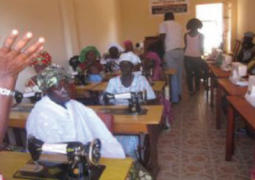
The minister of Finance and Economic Affairs has expressed concern over the country’s domestic debt, stressing that this is costly and is more of a burden to the 2012 budget than the external debt, which he said is highly concessional.
Mambury Njie, who was speaking Friday while presenting the 2012 budget statement and economic policy of the
He told deputies that the fiscal outlook for 2012 marks the beginning of the Program for Accelerated Growth and Empowerment (PAGE), the successor programme The primary objective of the Gambia government, he said, has been commitment to alleviating poverty, accelerating growth and improving the well-being of the population.
Njie told deputies that the PAGE is expected to be funded by domestic resources, traditional donors and non-traditional donors and it is based on the Vision 2020 and various sector strategies, and it is the execution template for the government’s long-term vision.
“Consistent with the Paris Declaration’s resolutions on aid efficiency and the ownership of development, PAGE acts as the main interface between the government and its development partners,” he said.
According to him, given the gloomy picture of the world economic outlook characterized by threats of double dip recession in some developed countries, the fiscal outlook for The Gambia has been cautiously projected.
Total revenue and grants for 2012, he went on, is projected at D5771.3 million (17.6 percent of GDP) as against a total of D5650.2 million (17.8 percent of GDP) a year earlier.
“Tax revenue is forecasted at D4613.9 million in 2012 increasing by D23.6 million from its previous year level of D4590.3 million.
In the fiscal year 2012, grants are projected at D1157.3 million against D1059.9 million in 2011 indicating a 9.2 percent increase,” Finance minister Njie further told deputies.
He added that the total expenditure and net lending for the year ending 2011 is D6116.5 million (19.3 percent of GDP).
However, he continued, during the course of the year 2012, total expenditure and net lending is projected at D6722.8 million or a 10 percent increase by D606.3 million from its 2011 level.
This, he said, is mainly due to a higher than expected increase in external resources.
“The fiscal deficit for the year ending 2011 is D466.6 (1.47 percent of GDP). The deficit for 2012 is projected at D951.4 million (2.9 percent of GDP),” he announced, adding that the deficit will be financed through domestic and external borrowing.
The finance minister also noted that in its effort to mobilize resources, the
He explained that tax revenue to GDP ratio has been declining constantly over the past three years, resulting in less than desirable implementation of its developmental objectives.
For this reason, he went on, government is proposing the implementation of a quota system on duty exemptions on fuel for diplomatic missions; expand excise tax coverage through the collection of excise taxes on domestically produced goods; and holders of the Special Investment Certificate (SIC) whose certificates have expired to be brought into the tax net.
He further added that government proposes to remove the protection on sugar and cement, as the protection has not made any difference in the market; increase the revenue tax on laundry soap from D5 per kilo to D7.5 per kilo; and to remove the fuel concession given to the Gambia Ports Authority.
Finance minister Njie also told deputies that, despite the global economic meltdown and fears of a double dip recession faced by developed countries, The Gambia’s economy still remains resilient with growth estimated to be at 5.5 percent in 2012.
“However, caution must be exercised as, despite the economy’s resolute characteristic, the contagion effect of some developed economies, especially those in Europe, who are our main trading partners could derail our efforts of sustained economic development,” Njie stated.
The implementation of the country’s medium term plan, the PAGE, he said, will go a long way in helping the country meet its MDGs and Vision 2020 objectives.
Although strides have been made towards achieving the MDGs, the minister of Finance and Economic Affairs said, a lot remains to be done.
He assured all that, with strong leadership and a realistic strategic plan in the form of the PAGE, the country’s objectives can be met.
Read Other Articles In Article (Archive)
Gikiba FC, Nema Utd sail to 5th round in East Nawetaan Qualifiers
Jul 28, 2011, 2:43 PM


